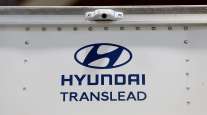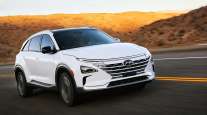Contributing Writer
Hyundai Readies Fuel Cell Truck for US Market

[Stay on top of transportation news: Get TTNews in your inbox.]
Hyundai Motor Co. said it would expand its fuel cell truck sales efforts to the U.S. and China and significantly increase production over the coming year.
The South Korean manufacturer launched a heavy-duty fuel cell truck venture in Switzerland last month using a vehicle it calls the XCIENT Fuel Cell. The first seven of 1,600 trucks are now transporting freight on Swiss roads for several European retailers.
The company said Oct. 7 that it now plans a one-year demonstration project with a U.S. company, but did not provide more details.
Hyundai said it is already in talks to see a triple-digit supply of hydrogen trucks in 2022, but did not provide specific numbers. By 2030, Hyundai expects more than 12,000 fuel cell trucks from multiple manufacturers on U.S. roads.
Hyundai executives said the U.S. longhaul market is a good target for hydrogen fuel trucks, and believe the technology has advantages over electric trucks. Sae Hoon Kim, senior vice president of Fuel Cell Center for Hyundai Motor Group, noted in a briefing with reporters that fuel cell trucks have a lighter powertrain that doesn’t require a battery which can decrease payload capacity.
Introducing XCIENT, the world’s first fuel cell heavy-duty truck from Hyundai. By 2025, there will be 1600 trucks on the road, creating a clean, fossil-free future for everyone. Learn more: https://t.co/eiAr4w8N5i #HydrogenFuelCell #HydrogenPower #SustainableSolution pic.twitter.com/Suhf5rD6lj — Hyundai Worldwide (@Hyundai_Global) September 8, 2020
Other companies also plan to launch hydrogen trucks in the U.S. Toyota Motor Corp. said Oct. 5 that it is partnering with its Hino Trucks subsidiary to develop a Class 8 hydrogen fuel cell truck for the North American market. Toyota has spent several years developing a pilot hydrogen truck program using a Kenworth cab and chassis.
Nikola Inc., a Phoenix, Ariz., startup, also has plans to develop fuel cell Class 8 trucks. But the company became the target of a Securities and Exchange Commission probe into alleged fraud earlier this year over whether it deceived investors about aspects of its technology. Nikola has denied any wrongdoing and issued a statement saying it welcomed the investigation.
For now, battery-electric trucks are gaining momentum as the alternative powertrain of choice. Both Daimler’s Freightliner division and Volvo are starting to place them with customers. Volvo plans to launch commercial production next year and Freightliner will follow in 2022.

What are industry executives doing to help bring more women into the fold, not only as drivers, but in leadership roles? Host Michael Freeze talks with Ellen Voie of Women In Trucking and Debora Babin Katz of TrucBrush Corp. Hear a snippet, above, and get the full program by going to RoadSigns.TTNews.com.
Fuel cell trucks still have considerable hurdles, said Mike Ramsey, automotive and smart mobility analyst at Gartner Inc.
“Hydrogen fuel cells may be the endgame for trucking technology because of the ability to marry long-range, quick refueling with no pollution. But sort of like nuclear fusion, the technology development has never quite been ready,” Ramsey told Transport Topics.
The fuel cell stack is expensive. Hydrogen has to be contained under high pressure, so the tanks are expensive and relatively large compared to diesel tanks, he said.
“And finally there’s the issue of refueling. There simply isn’t infrastructure to create, move, store and refuel with hydrogen and to build it will take decades and billions of dollars,” Ramsey said.
Hyundai said it plans to scale up its capacity to assemble up to 2,000 units per year by 2021.
“This is not a demo project with limited scope. This is real commercialization with daily operation of regular fleets. There are no limits,” said In Cheol Lee, executive vice president and head of Commercial Vehicle Division at Hyundai Motor.
While the company has a subsidiary that sells trailers in the U.S., it does not market heavy-duty trucks in the U.S. It will launch the business with direct sales and will later consider adding a dealer network, Lee said.
Fuel cell trucks have electric drive systems and often share components with battery electric vehicles. The fuel cell system creates electricity from hydrogen and replaces the heavy battery pack in an electric truck.
Hyundai’s Xcient Fuel Cell is a 4X2 cargo truck with a gross vehicle weight of 36 tons, including the trailer. The fuel cell propulsion system is based on the South Korean automaker’s Nexo passenger vehicle, said Martin Zeilinger, head of research and development for commercial vehicle at Hyundai Motor Co. The powertrain contains two 95kW fuel cell systems paired with a 72kWh high voltage battery and a 350kW e-motor.
Hyundai said it also would produce a 6X4 tractor for the North American market. The first Hyundai trucks in the U.S. will be cabovers like their European counterparts. The company said it is considering designs that would include a traditional American-style cab in later models.
The trucks have a range of about 250 miles.
“This integrated fuel cell propulsion system ensures superior performance uphill and regenerative braking for the best fuel efficiency downhill,” Zeilinger said.
Safety features include an adaptive cruise control system that automatically adjusts speed with traffic and an automatic emergency braking system.
Hyundai chose Switzerland to launch its fuel cell trucks because it exempts zero-emission commercial vehicles from high tolls. That put the operation cost on par with internal combustion trucks and created a business case for building out a 100-station hydrogen fueling network that will also be used for passenger vehicles. The company is discussing expansion into other European nations with potential partners.
“We need to create country-specific or even region-specific business models since ‘one size fits all’ or ‘copy and paste’ doesn’t work here,” said Mark Freymueller, CEO of Hyundai Hydrogen Mobility.

Freymueller
He estimated that it takes 10-15 heavy-duty fuel cell trucks daily to make a fueling station viable. That compares to 700 passenger cars. He said that locating stations on heavy truck routes would ensure the business could build out a fueling network.
Hyundai projects that hydrogen’s price will drop to about $4 per 1kg by 2030 and will keep declining in subsequent years as infrastructure is built out. That prices the fuel at about the same cost of fossil fuels for trucks, Hyundai said.
Want more news? Listen to today's daily briefing:
Subscribe: Apple Podcasts | Spotify | Amazon Alexa | Google Assistant | More




